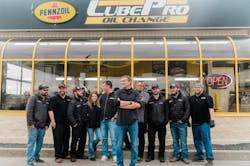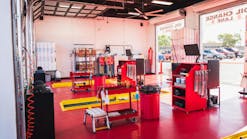When Justin Moore started Lube Pro Oil Change and Inspection Xpress 14 years ago, he was new to the quick lube industry. But he had experience running businesses, and he knew what kind of operation he wanted to run.
“I learned very quickly that people don't like to be controlled,” he says. “They like to be their own entity within a company. And so the way I saw it was more of a family, and people having more control over their job.”
That kind of company culture can be great for employee involvement. It promotes a sense of ownership within each team member’s role. With the right people in place, a cycle of support forms that rewards good employees for their work while sustaining a growing business. Moore started the cycle by providing a robust benefits package for a business of that size, responding to employee needs and fostering a healthy work environment.
All these years later, Moore has the results he wanted. He built a successful, independent operation with high-performing people on staff, good car counts, and low turnover. The key to getting there was a challenging act with a simple explanation: Moore built a Best Workplace.
SHOP STATS: Lube Pro Oil Change and Inspection Xpress Location: Lubbock, Texas. Operator: Justin Moore Average Car Count: 45 Staff Size: 9
The Backstory
It all started when Moore saw a listing about a single-bay quick lube business for sale.
Moore had always been a self-starter. He had run an irrigation business and a farming operation in the past, and was looking for a new opportunity. The quick lube was a new field, but he was interested.
“I came across this place in the local paper. It was just a business for sale,” he says. “And I drove by three times to see it.”
Moore purchased the business, and in the intervening years, Lube Pro Oil Change and Inspection Xpress has grown to incorporate one additional bay for inspections, as well as a separate location solely for inspection services. The quick lube business has thrived, with car counts hovering between 40 and 50. Include the inspections, and a lot of cars come through the locations.
“When I first purchased the place, it averaged about eight cars a day—oil changes and inspections,” Moore says. “And we’re averaging today about 150.”
Benefits include:
—
- Uniforms
- Tools
- Medical Insurance
- Paid Time Off
- Bonus Pay
Allocating Resources
Moore says that the bare-bones staff needed to run the operation would be five, but a hallmark of his strategy is making sure that he’s not running a bare bones operation, even in lean times. He has nine staff members, all of whom work full-time.
That’s a great model when employees need time away from work—staff receive paid time off—but even then it’s not enough to retain them for years.
“I knew that I would need some sort of benefit package like that to be able to employ decent people—and also to keep them,” Moore says.
He offers health insurance to his employees that’s fully paid by the company. He pays for uniforms and says that he’s quick to replace tools that are needed in the shop. There’s also a generous bonus system that pays out at least twice per year—more during a successful stretch.
“I give them as much as I possibly can,” Moore says. “Because they're the ones making the money, and they’re the ones dealing with the customers every single day. They deserve it.”
For small, independent shops, the decision to offer certain benefits is a serious financial consideration. Jerod Starch, Lube Pro shop manager, says that it took time for the operation to work up to that level of benefits. He credits Moore with taking the long view early on to build a foundation that can provide and maintain benefits during times both good and bad.
“Our focus was 10 years down the road at that point,” Starch says of the early days. “That's why we got along so well.”
During the 2020 COVID-19 shutdowns, Starch says that the inspection services had to close down for a short time. But payroll continued for all employees. He’s proud of that.
“Absolutely no pay cuts,” he says.
“Number one, we’re a small company. There’s a family aspect there. We really pride ourselves on knowing the families are taken care of. And that stretches in all directions.”
-Jerod Starch, shop manager
Creating the Culture
Creating a Best Workplace means that the operator has set up a cycle of support throughout the business.
That might start with the benefits and incentives offered by the owner, which, on paper, are a way to begin that cycle. But there’s more to it. Moore also lets his employees in on the daily sales trends to let them know how the shop is performing. That’s to give the entire team a sense of ownership and agency in the impact they make on those daily numbers.
When employees stay together for longer periods, a strong sense of community forms.
“If anybody needs help they’ll get together and make it happen, whether it’s emotional, financial, whether it’s just needing help moving things,” Moore says. “They help each other. And when you create that sort of scenario, people don’t want to leave.”
The shop’s low turnover is a testament to that. Moore says that when he first took over, an average inspector might last six months. Today, all staff members are cross-trained for quick lube and inspection procedures to help avoid burnout in one specific role. Many on staff have been there for years.
Starch has been with the company for 12 years. He says that Moore’s leadership has been the reason he’s stayed on for so long.
“My ultimate decision to stay has always been him,” Starch says.
Creating a Best Workplace is often about how owners create opportunities from the top down. And it’s true that it’s up to them to form an environment in which staff members can thrive. To be sustainable, a Best Workplace needs to complete the cycle of support. The employees who benefit from the shop’s culture must carry through with their part.
To Moore, success is when he can trust that the cycle will complete itself.
“What I get is trust within each other. They know that they’re going to have these benefits, and I know that they’re going to have my back when it comes to treating the customer right,” Moore says. “And I make sure that they know that the thought that customers leave with has got to be positive. That’s where I put my trust in them.”






